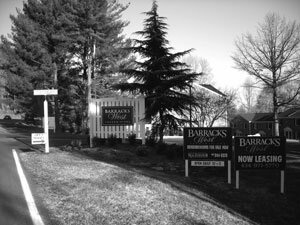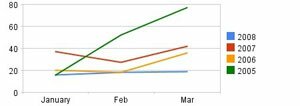ONARCHITECTURE- Condo hustle: The market's last gasp?

Old Salem Apartments, converted to Barracks West Condominiums in 2006, was part of the 2006 condo conversion craze.
PHOTO BY DAVE MCNAIR
Last year, the Hook wondered if the so-called condo conversion craze had come to a halt ["Mondo condo: Lessons from last year's 'craze'," February 1, 2007]. At the time, the market was flooded with condos as developers locally and across the nation were busy converting apartment complexes, hoping to tempt new buyers (some of whom had no business buying anything) into a hot market at a time when sub-prime loans were still available.
At the time, it seemed like a good idea, as would-be buyers, rocked by jaw-dropping prices on single-family homes, could obtain a condo priced below $250,000.
"In Charlottesville, where real estate is so expensive," developer Richard Spurzem put it, "suddenly you have a situation where the only thing people can buy is what used to be a crappy old apartment."
And buyers snapped them up like crudités. In fact, according to developer Hunter Craig– who acknowledges he "did well" with his 184-unit Hessian Hill condo conversion in 2005– his Jefferson Place condos were still "selling like hotcakes" in early 2007.
At the same time, however, Craig appeared to be preparing for what was to come, trying to salvage his $31-million purchase of the Old Salem Apartments– which he renamed Barracks West and planned to sell as condos– by enlisting the help of a corporate real estate agency to sell 277 units to investors interested in operating them as rental properties.
Meanwhile, the conversion strategy has taken its toll on renters, who were booted en masse from converting apartment complexes. At Walker Square, one renter, who was able to buy her unit, says the place was "basically empty" immediately after the conversion and "lost all sense of community."
Regardless, soaring condo sales allowed the Charlottesville Area Association of Realtors (CAAR) to declare 2006 "the second best year ever": 362 condos sold in 2006 compared to 155 in 2005, a 133 percent increase.
Ah, what a difference a year makes. Absent those condo sales, it's no wonder CAAR CEO Dave Phillips subtitled his 2008 first-quarter market report "a recipe that's hard to swallow."
In the first quarter of 2008, it took an average of 122 days to sell a property in Charlottesville compared to 49 days last year. Albemarle County saw a 40 percent drop in home sales, Charlottesville a 27 percent drop. While condo sales in Charlottesville continued to move (37 in the first quarter of 2008 compared to 46 in the same period in 2007), condo sales in the County plummeted 66 percent.
In addition, first-quarter new home sales dropped sharply, from 196 in 2006 to 94 in 2008. There are also 3,673 houses on the market right now, 573 more than at the same time last year.
Oddly enough, first-quarter median house prices have risen, from $249,500 in 2007 to $279,500 this year in Charlottesville, and from (take a deep breath, County residents) $289,000 to $340,600 in Albemarle County for the same period. According to Philips' report, the County's $51,600 price jump has a lot to do with the decrease in condo sales, a trend abetted, Phillips adds, by the shrinkage in financing available for condos. Phillips suggests that less expensive counties are getting some of the buyers who might once have settled in Albemarle, and another factor, he says, is the higher-end market is less affected by the lending crisis.
"Condo conversions are definitely over and done with now," says realtor Jim Duncan.
Meanwhile, many condo buyers have been left holding the conversion craze bag. Indeed, a look at properties that went into foreclosure this year reveals a surprising number of condos on the auction block.
"A colleague of mine put it this way," says one real estate professional. "'I knew we were in trouble when the condo conversion business strategy began to work.'"
So who's to blame? The developers for marketing "crappy old apartments" as real estate investments to buyers who may have had no business buying? The buyers foolish enough to fall for it? Or lenders offering risky loans that buyers couldn't handle?
As Spurzem said last year, "Condo conversion became all the rage... created by developers who thought they could make some money... and everyone jumped on the bandwagon."
However, what's to come could be worse, as sagging sales turn condos back into apartments with cash-strapped owners living elsewhere.
"These investor-owned properties tend to fall apart," Spurzem predicted last year, "because no one is nearby to keep a watch on things. People can't get their dishwashers fixed because the landlord lives in Ohio somewhere. It ends up being a screwed-up situation."

This graph shows that Charlottesville's condo sales have chilled.
GRAPH COURTESY JIM DUNCAN
#